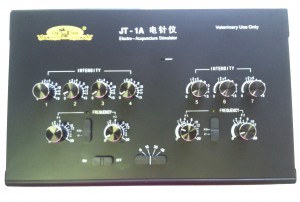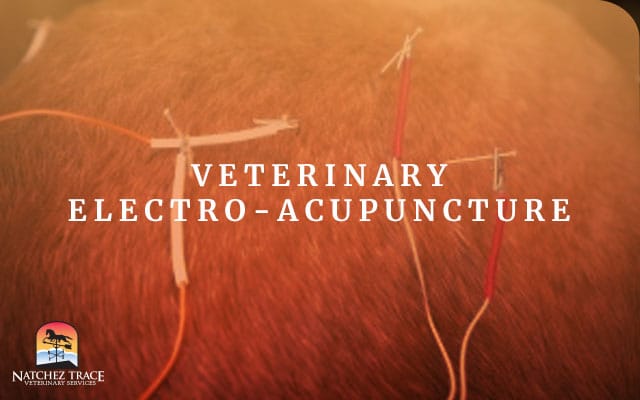What is Veterinary Electro-Acupuncture?
Veterinary electro-acupuncture is a type of acupuncture where an electric current is passed between pairs of acupuncture needles. Another name for the procedure is percutaneous electrical nerve stimulation (PENS).
During electro-acupuncture, the vet places small filiform needles at predetermined points on the body. The goal of animal electro-acupuncture is to help the Qi (vital energy, life-force) move freely throughout the body.
When Qi moves freely throughout the body, it is in a healthy, balanced state.
When Qi cannot move freely, disease occurs. Veterinary electro-acupuncture is similar to traditional veterinary acupuncture in the fact veterinarians stimulate the same points during treatment.
What Happens During an Electro-Acupuncture Session?
During a veterinary electro-acupuncture session, the veterinarian inserts acupuncture needles at pre-determined points along the body.
The needles are then attached to an electro-acupuncture stimulator, which is a device that generates continuous electric pulses.
The stimulator is attached to the needles in such a way that electrical impulses can pass between two specifically chosen needles. Several pairs of needles can be stimulated simultaneously.
The acupuncturist is able to adjust the frequency and intensity of the electrical impulse being delivered depending on the particular condition being treated during the session.

The typical veterinary electro-acupuncture session lasts approximately thirty minutes. Animals experience little to no pain from the needles.
They may become a little anxious when the electrical pulse begins, but in most cases settle down shortly after treatment has begun. Many animals become very relaxed or sleepy during and after a session.
Conditions Successfully Treated with Veterinary Electro-Acupuncture
- Pain Management
- Bi-Syndrome
- Arthritis
- Soft Tissue Injuries
- Colic/Abdominal Pain
- Post-Operative Pain
Neurological Disorders
- Intervertebral Disc Disease (IVDD)
- Peripheral Nerve Paralysis: Facial Nerve Paralysis, Radial Nerve Paralysis
Internal Medical Conditions
- Gastrointestinal Conditions: Anorexia, Vomiting, Diarrhea, Constipation
- Respiratory Diseases: Coughing, COPD
Other Conditions
- Infertility
- Renal Failure
- Muscle Atrophy
Contact us to learn more about Veterinary Electro-Acupuncture for your pet.
Sources:
Schedule a TCVM Consultation with Dr. Smith








